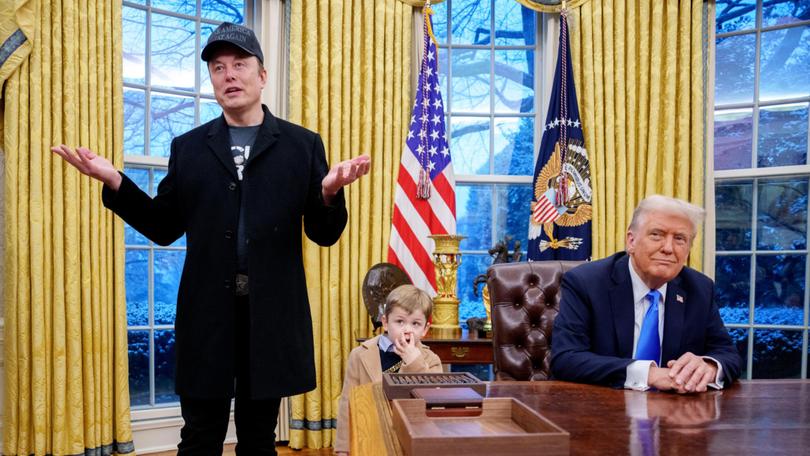THE ECONOMIST: Is DOGE doomed? Elon Musk is failing to cut American spending for Donald Trump
Official data shows that Elon Musk has scarcely made a dent in spending, in fact Donald Trump’s government expenditure has gone up.

It all seems to add up to something big. On a daily, sometimes hourly, basis, Elon Musk claims that his team of fiscal commandos has found yet more government fraud, terminated another wasteful contract or even scrapped an entire agency. Mr Musk’s supporters believe that, through tech wizardry and sheer willpower, he is slashing the federal deficit in a way that has eluded politicians for years. But this narrative has a glaring flaw: our review of official data shows that Mr Musk’s efforts have scarcely made a dent in spending.
Every working day the Treasury publishes a statement detailing withdrawals of cash from its primary deposit account, providing the best high-frequency indicator of government spending. Since Donald Trump took office a little more than three weeks ago, outlays have averaged $US30 billion ($48b) a day. Compare that with the same period last year under Joe Biden: federal spending back then came to about $US26b a day. Outflows from the Treasury have actually risen since January 28, when Mr Musk first claimed his “Department of Government Efficiency”, or DOGE, was saving the federal government $US1b a day. Looking at the bigger picture, the government’s spending trajectory in the current fiscal year, which began in October, basically resembles that of the past two years.
Such comparisons are far from perfect. Flows in and out of government coffers are volatile. In nominal terms spending naturally rises over time, pushed up by inflation. Perhaps outflows would have been even larger in the absence of DOGE. And the agency is still in its infancy. Nevertheless, the gap between Mr Musk’s declarations and his apparent failure to cut spending shows the difficulties facing his project. Mr Musk has promised over $US2 trillion in annual savings for the federal government. He will struggle to get close to that.
Sign up to The Nightly's newsletters.
Get the first look at the digital newspaper, curated daily stories and breaking headlines delivered to your inbox.
By continuing you agree to our Terms and Privacy Policy.In large part this is because of the way America’s budget is structured. The government is on track to spend $US7 trillion this year. Nearly two-thirds of this consists of mandatory expenditures on social security and health insurance. Interest payments account for over 10 per cent. That leaves a quarter of the budget for discretionary spending, a category which in theory is somewhat easier to trim — except that half of it goes on defence and Republicans would like to increase such spending. In other words, no matter how aggressive DOGE is, its actions are focused on barely more than a tenth of the overall federal budget.
Mr Musk says he will produce vast savings by rooting out fraud and waste. Undoubtedly an organisation as large as the American government has fat on its bones, and would benefit from an exercise regime. But it is more accurate to view it as flabby rather than morbidly obese. The government accountability office, a watchdog, estimates that losses from fraud have in recent years run between $US233b and $US521b a year. Were it possible to identify and zap all of that fraud in real time — an extremely tall order — it would still not get Mr Musk close to his ultra-abstemious targets.

In any case, DOGE’s efforts appear to be pretty scattershot. Many of its spending reductions have targeted specific things that Mr Trump deems wasteful such as “diversity, equity, inclusion and accessibility” programmes. Yet these amount to a tiny sliver of the federal budget. The full value of the savings publicly announced by DOGE (on its account on X, Mr Musk’s social network) adds up to about $US7b so far. Moreover, some of the reductions came from scrapping multi-year contracts, meaning that the annual savings amount to less than the headline figure. If the controversial closing down of USAID, America’s main international-development agency, counts as a cost-cutting success for DOGE, its total savings would reach about $US45b per year, or just 0.6 per cent of federal spending.
None of this is to minimise DOGE’s impact. It has already put thousands of government employees on leave. Armed with a new executive order from Mr Trump, it is now preparing to make mass lay-offs, though it may lack the legal authority to do so. Civil servants are disoriented and anxious about their future — an outcome that will surely please Mr Musk, who relishes his role in the war on bureaucracy.
But the core mission of DOGE is to save money. “It’s not optional to reduce federal expenses. It’s essential,” Mr Musk said on February 11. And on that count, he appears set to come up woefully short.
Originally published as Elon Musk is failing to cut American spending
